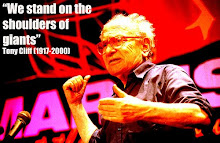Posted item #5 Democratic revolution or socialist revolution?
As I noted in an earlier post, the key principle of Marxism for Cliff was always: the emancipation of the working class is the act of the working class itself. Socialism and human liberation cannot be legislated by well-meaning reformers, fought for by guerilla revolutionaries, or imposed by the gun or the bomb. Cliff rejected the notion that the Soviet Union was socialist - he saw that it was state capitalist, with a different form of capitalism to the Western variants but capitalist nonetheless: driven by economic and military competition (primarily with the US), divided into classes, and reliant upon exploitation of workers. It can't have been a workers' state because the workers clearly had no control over their own economy or society.
Similarly, the Communist states established in Eastern Europe after 1945 were top-down regimes, in which democracy was absent. It made a mockery of socialist principles to suggest they had anything in common with genuine socialism. They had been achieved without any grassroots workers' struggles, without revolution. Where, then, was the self-emancipation of the working class?
He analysed Mao's regime in China from the same point of view and - controversially on the left - rejected the idea that Castro's Cuba could be regarded as socialist. Democracy was and is the heart of the revolutionary socialist tradition.
By emphasising this fundamental principle, and testing the claims of states to 'socialism' against this criterion, Cliff recovered the thread of 'socialism from below' - the lineage of Marx, Engels, Luxemburg, Lenin and Trotsky - from the travesty of Stalinism. He played a key role in renewing the classical Marxist tradition - in theory and in practice - for new generations.
The chapter from Marxism at the Millennium - a short book published shortly before Cliff's death - I'm posting here is a re-statement of Cliff's ideas about the relationship between democracy and socialism. It recognises the severe limits placed on democracy by capitalist society. For him, the thwarted democracy we have in modern capitalist societies is a poor deal - real democracy is radically different, and depends upon economic control by the working class.
From this perspective the question of what a revolution's aims are becomes hugely important. A revolutionary movement that aims only for political democracy and power is doomed to perpetuate the injustices and miseries of capitalism. The alternative is the kind of radical economic democracy associated with the early period of Russian revolutionary government after October 1917. Though revolution tends to seem distant for us, this issue has in fact recurred, in many parts of the world, ever since the Russian Revolution.
In a world as unstable, violent and crisis-ridden as ours, there are sure to be more revolutionary upheavals and democratic upsurges. Learning the lessons of history is essential in determining what it means - in practice - to be a revolutionary in the 21st century.
Thursday, 6 August 2009
Cliff on revolution, democracy and socialism
Labels:
China,
Cuba,
democracy,
Eastern Europe,
revolution,
socialism,
Soviet Union
Subscribe to:
Post Comments (Atom)

No comments:
Post a Comment